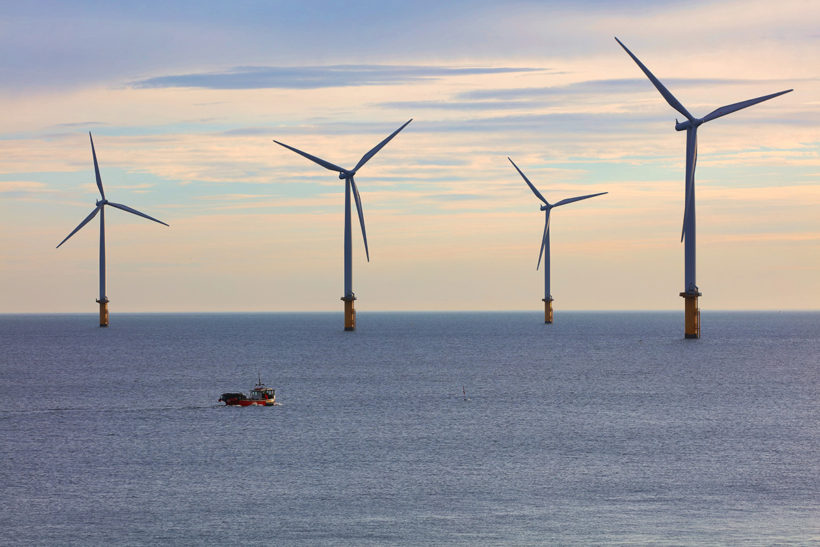Renewed focus on onshore development and more strategic approach to offshore energy planning
By Andy Read, Editor, Fishing News
The new Labour government confirmed its commitment to the accelerated roll-out of renewable energy in the King’s Speech to parliament, maintaining its highly ambitious target to see all electricity in the UK generated from renewable sources by 2030.
However, whilst targets for total power delivery from offshore wind have been increased, the new approach may see fishing given a more prominent position in decision- making about the siting of farms, and lead to shore-based infrastructure developments that could support further evolution of the UK fishing fleet.
King Charles laid out plans to take the brakes off onshore wind and solar development, create a new government-owned clean energy company, Great British Energy, and give the Crown Estate new powers to accelerate the development of offshore wind power.
Onshore solar and wind – much cheaper options than offshore wind – have already received a boost, with three large solar farms receiving ministerial approval.
The Great British Energy Bill, details of which have now been published, specifies that the new company will ‘develop, own and operate assets’, investing in partnership with the private sector. It will also ‘facilitate, encourage and participate’ in the production, distribution, storage and supply of clean energy.
Great British Energy will be headquartered in Scotland and backed with £8.3bn in funds over the five-year parliament.
The government will also introduce a Crown Estate Bill, which will give it the power to borrow money against future revenues. Although the Crown Estate holds large amounts of cash, and is a big contributor to the exchequer, it is not currently allowed to use these funds, which are a safeguard against possible future losses. Last week it reported an annual profit of over £1.1bn, of which £132m will be paid to the king for his ‘household expenses’, a £45m rise on the last payment. No wonder he is an advocate of offshore wind!
The government also plans to widen the Crown Estate’s power to invest in activities that ‘complement its strategy and support wider government policy objectives, such as digital technologies to support offshore energy development and port infrastructure’.
The proposed bill does not affect Crown Estate Scotland, which is a separate entity.
Industry insiders estimate that the moves may provide for an additional 20GW to 30GW of offshore wind seabed leases by 2030, although the consensus remains that the 2030 target for 100% renewable electricity will not be met. For comparison, the Dogger Bank wind farm, which occupies a seabed area of 1,675km2 , will produce around 3.6GW at full production.
NFFO chief executive Mike Cohen told FN: “The need to decarbonise the British economy is not really in doubt, but it is also clear that the development of offshore energy will bring spectacular profits for some. The foreign energy giants that own and operate the wind farms already built in British waters have been doing extremely well for years.
“A lot of people are making astonishing amounts of money as a direct result of policies that are changing the marine environment and squeezing fishermen out of their traditional grounds. There has been a lot of talk about a ‘just transition’ to a new, lower-carbon economy, but I see no signs of justice in any of this.
“The government’s new approach to onshore renewables may relieve some of the pressure on the sea, and the advent of the Great British Energy company brings with it the possibility of a more strategic approach to offshore energy planning, rather than the piecemeal approach that disadvantaged fishing so badly before now. This is clearly a point of change in the UK’s approach to energy generation.
“There is an opportunity here for government to take better notice of the health of our fish stocks and the needs of our fishing fleets when it develops energy policy and takes infrastructure planning decisions. A just transition is still possible, but the right choices need to be made now in order to ensure it.”
The subject was also discussed during the meeting between the SFF and fisheries minister Daniel Zeichner in Westminster last week. SFF chief executive Elspeth Macdonald said: “The prime minister has made no bones about his ambition for increasing the scale and pace of offshore wind, and we reiterated the points to the UK minister made a day earlier to Scottish first minister John Swinney about the direct and indirect effects, as well as risks of unintended impacts of this push for more offshore wind.”
This story was taken from the latest issue of Fishing News. For more up-to-date and in-depth reports on the UK and Irish commercial fishing sector, subscribe to Fishing News here or buy the latest single issue for just £3.30 here.
Sign up to Fishing News’ FREE e-newsletter here.






